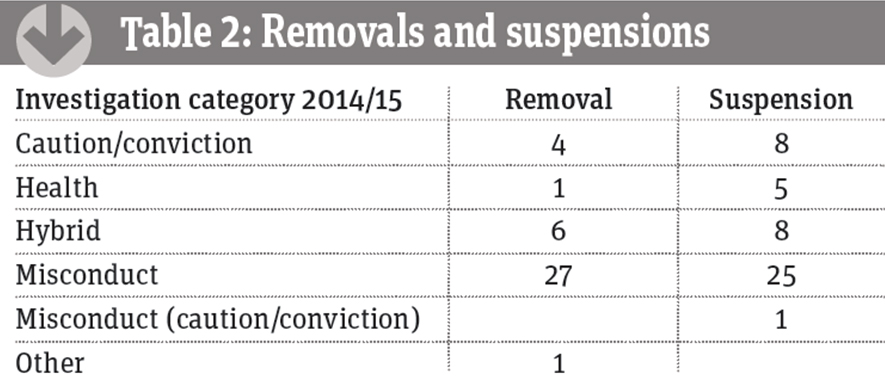Analysis

Steep rise in complaints against pharmacists
In Analysis
It’s time to delve deeper into health discussions. Broaden your understanding of a range of pharmacy news and topics through in-depth analysis and insight.Bookmark
Record learning outcomes
Complaints against pharmacists are rising fast, as they are for other healthcare professionals, mainly driven by aggrieved patients. We look at the latest figures from the GPhC.
The number of people removed from the GPhC register rose to 40 in 2014/15 and there were 49 suspensions. In 2013/14 there were 23 removals and 24 suspensions. The number of complaints rose from 1,038 to 1,597 – a 54 per cent increase over the same period and a 106 per cent increase since 2011/12 (see Table 1 below).
Most complaints (1,432) were received via the GPhC website. The GPhC says that while there has been a significant increase in the number of concerns raised, other regulators are also experiencing this trend. There are likely to be a number of factors causing this, it says, but there is no conclusive evidence to suggest that standards are slipping.

Â
No further action
More than 50 per cent of the complaints dealt with resulted in no further action or were outside the GPhC’s jurisdiction. In the majority of cases (62 per cent), complaints concerned misconduct (see also Table 2). The cases most likely to be closed with no formal action taken were those relating to dispensing errors where there had been no harm to the patient, although a letter of advice is often provided.
While pharmacy technicians make up nearly one-third of the register, over 90 per cent of complaints that progressed beyond the initial investigation stage involved pharmacists. Comparing statistics on a calendar year basis is complicated because concerns are received by the GPhC throughout the year and not all concerns can be resolved within the calendar year they are received.
Currently, around 20 per cent of the GPhC cases are over 15 months old. The GPhC is aiming to close cases within 12 months and reduce the number of older cases.
When those complaints that fall outside the GPhC’s jurisdiction are stripped out from the figures, removals from the register were down in 2015 in percentage terms (4.8 per cent of the cases within jurisdiction) compared to 2014 (5.5 per cent), although still significantly more than in 2012 (2.5 per cent). Suspensions were nearly half the 11 per cent they were in 2012.

 Public concern
Public concern
Of the 1,597 concerns reported to the GPhC in 2014/15, 1,067 were from members of the public, 92 were self-referrals, 49 were raised by employers and 45 by GPhC inspectors. Since January 2015 the regulator has been receiving an average of 140 cases a month.
Duncan Rudkin, chief executive of the GPhC, told Pharmacy Magazine: “There has been a steep rise of 54 per cent in the number of concerns raised with us in 2014/15, but even in the context of this significant increase we have been able to make improvements to the way we manage cases, including by reducing the amount of time a case is ongoing. And we continue to carefully review and assess every concern we receive and to deal with cases in a proportionate way, in the public interest.
“We have increased the number of staff who deal with fitness to practise concerns, improved the online form on our website to make it easier for people to report a concern, and streamlined a number of our operational processes.â€
Â
The GPhC’s complaint process
Every complaint received by the regulator is reviewed and assessed to decide how to proceed. The review may result in a case being closed if it falls outside the GPhC’s jurisdiction. If it is within its jurisdiction, an investigation is started, led by an inspector or a specialist case worker or, for complex cases, both.
Following the investigation, it may be recommended that the evidence is considered by an investigating committee, which meets in private. The investigating committee can decide to:
- Take no action
- Issue a warning or a letter of advice
- Refer the case to a fitness to practise committee for a hearing.
